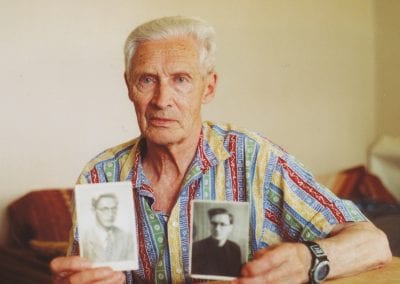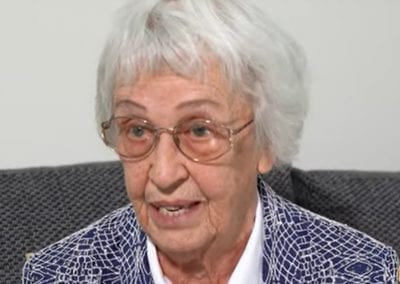On June 14, 2020, I published the results of the project „Baltic Memory of the Gulag.“ It is available on our Gulag Online virtual museum, which is one of the Gulag.cz Association projects.
Thanks to our cooperation with partners in all of the Baltic states – Misija Sibiras in Lithuania, the Museum of the Occupation in Latvia, the Estonian Institute of Historical Memory – and thanks to the support of the Baumanis Grant for Creative Projects in Baltic Studies, we were able to portray 2-3 stories from each Baltic country that illustrate the repressions and deportations carried out by the Soviet regime against the Baltic nations.
Roberts Purins
Born in 1920 in Latvia, after Soviet occupation 1940 in resistance movement, sent to Gulag for 3 years. Returned home and arrested again in 1951, deported to Siberia.
By using a moving map, we can trace the stories’ geographical form. The stories of specific individuals show the tragic consequences that the USSR’s decisions to annex a foreign territory had on the lives of ordinary people.
All of the stories are placed in a wider context by an introduction highlighting the history and scope of all the waves of deportation in the Baltic states.
The texts of the project are available in three languages (Czech, English, and Russian).
I was able to meet all the main goals I had proposed for my project:
The Baltic section has rapidly extended the scope of the virtual museum, and at the same time it helps to expose visitors from all around the world to the topic of Baltic history during the Soviet period. This project helps to put this history into a broader context.
All the stories are included in a storymap, which is a creative tool showing a personal story on an interactive map. Every story is accompanied by archival documents, photographs, and a recorded testimony (if available).
We created a new section of 3D photogrammetry models on the Gulag Online museum.
The Baltic section has rapidly extended the scope of the virtual museum, and at the same time it helps to expose visitors from all around the world to the topic of Baltic history during the Soviet period.
I started to prepare the project in September 2019. I contacted historians and partners in Baltic countries and personally visited them in the beginning of November in Vilnius (Aiste Eidukaityte from Misija Sibiras), Riga (Lelde Neimane from Museum of the Occupation and Dzitra Geka from Sibiras Berni) and Estonia (Elmar Gams from the Institute of Historical Memory and its oral history project Kogu Me Lugu). I discussed the project’s details and asked for each partner to provide me with 2-3 stories from each country.
In early 2020, the partner institutions sent me the materials for the stories which I then processed and uploaded on the project’s website. I cooperated with many people, including a translator to English Ian Willoughby, translators to Russian Olga Storozheva and Alexandra Skorvid, IT programmer Jan Vratny, and 3D designer Jindrich Plzak.
I processed the stories in April and May and wrote an introductory article which was reviewed by all the partners. Finally in the beginning of June together with Igor Suvorov we prepared the introductory movie of the project and the PR campaign on social media.
I had made plans to deliver presentations in the Baltic countries but unfortunately, due to Covid-19, we have had to cancel the trips and public presentations, hoping that we will be able to materialize these plans in the fall of 2020.
Stepan Cernousek
Gulag.online


